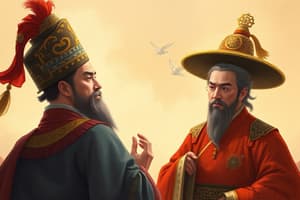Podcast
Questions and Answers
What does the term 'kowtow' refer to?
What does the term 'kowtow' refer to?
- A form of Chinese dance
- A traditional Chinese festival
- A bow before the Chinese emperor (correct)
- A type of Chinese food
What was the Treaty of Nanjing?
What was the Treaty of Nanjing?
A treaty signed at the end of the war with Britain, where China made key concessions including ceding Hong Kong.
What does extraterritoriality mean in the context of foreign relations in China?
What does extraterritoriality mean in the context of foreign relations in China?
Foreigners accused of crimes would be tried in their own country's courts instead of Chinese courts.
What was the queue hairstyle and why was it significant?
What was the queue hairstyle and why was it significant?
What is the Qing dynasty?
What is the Qing dynasty?
What was the Opium War?
What was the Opium War?
What was the Taiping Rebellion?
What was the Taiping Rebellion?
What are Spheres of Influence?
What are Spheres of Influence?
What was the White Lotus Rebellion?
What was the White Lotus Rebellion?
What was the Boxer Rebellion?
What was the Boxer Rebellion?
Who was Tzu Hsi or Ci Xi?
Who was Tzu Hsi or Ci Xi?
What was the Open Door Policy?
What was the Open Door Policy?
What is the Manchu?
What is the Manchu?
Flashcards are hidden until you start studying
Study Notes
Key Terms and Definitions related to the Qing Dynasty
-
Kowtow: A bow to the Chinese emperor symbolizing respect; refusal indicated a lack of respect for China and its authority compared to European nations.
-
Treaty of Nanjing: Signed post-British war; China made concessions such as surrendering Hong Kong; initiated one-sided treaties with other nations.
-
Extraterritoriality: Legal exemption allowing foreigners accused of crimes in China to be tried in their home countries, avoiding Chinese law.
-
Queue: A mandated pony-tail hairstyle imposed on Chinese citizens to signify inferiority to the ruling Manchu dynasty.
-
Qing Dynasty: The last ruling dynasty of China, which ended in the early 20th century.
-
Opium War: Conflict in the mid-1800s between Britain and China over British opium trade; resulted from Chinese efforts to suppress drug trade.
-
Taiping Rebellion: A significant uprising from 1850-1864 led by dissatisfied peasants against the Qing leadership, causing major destruction in southern and central China.
-
Spheres of Influence: Coastal regions in China where foreign powers held special rights and conducted business, often undermining Chinese sovereignty.
-
White Lotus Rebellion: An uprising led by a Buddhist group in 1796, reflecting the growing unrest and discontent among peasantry.
-
Boxer Rebellion: A violent uprising, encouraged by Empress Dowager Tzu Hsi, targeting Chinese Christians, European missionaries, and foreign businesses.
-
Tzu Hsi (Ci Xi): A powerful empress in the later Qing period, influential during the reign of child emperors.
-
Open Door Policy: An American initiative advocating for equal trading rights in China without colonization, preventing any single nation from monopolizing Chinese markets.
-
Manchu: The ethnic group that ruled China during the Qing Dynasty, originating from northeast Asia.
Studying That Suits You
Use AI to generate personalized quizzes and flashcards to suit your learning preferences.




